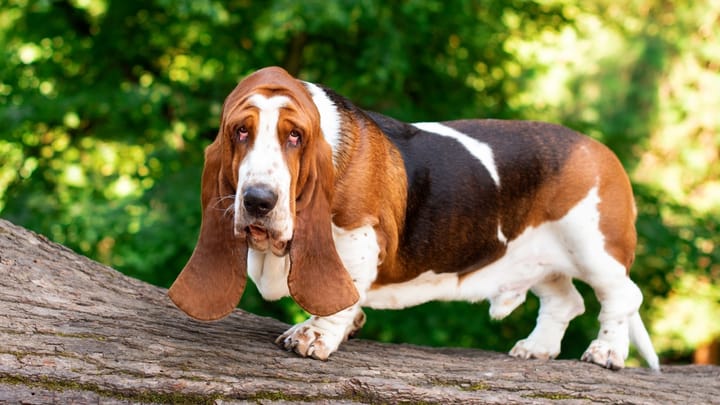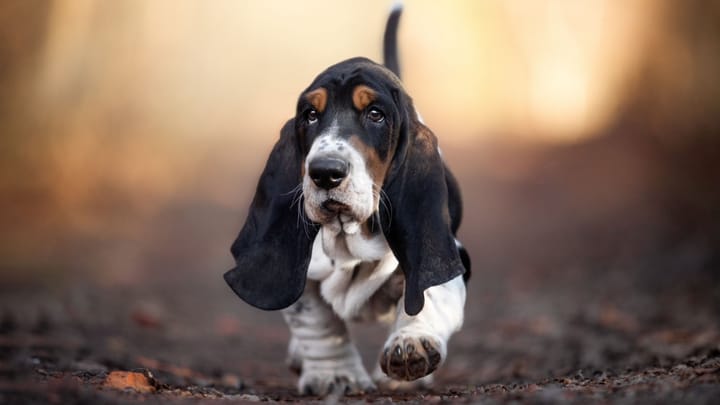Basset Hound


The Basset is a hound with an exceptional sense of smell, often put to good use during group hunting expeditions alongside their handler. Naturally sociable, the Basset can live harmoniously with other animals and thrives when surrounded by company. Though short-legged, this breed is active, highly resilient, and every bit as capable as other hound-type dogs.
|
Life expectancy |
The Basset Hound has a life expectancy of between 8 and 12 years |
|
Temperament |
|
|
Size |
Medium
|
|
Adult size |
Female
Between 13 and 15 in
Male
Between 13 and 15 in
|
|
Adult weight |
Female
Between 55 and 66 lb
Male
Between 55 and 66 lb
|
|
Coat colour
The Basset Hound is often tricolored (black, white and tan) but can also be bicolored (lemon and white). Any Hound colour is accepted. |
Black White Red |
|
Type of coat
The coat is short. The coat is smooth and close-lying. It should be neither long, soft nor fringed. |
Short |
|
Eye colour
The eyes are dark but can go up to a lighter brown in individuals with a lighter coat colour. |
Brown
|
|
Purchase price |
The Basset Hound costs between £700 and £840 |
Today, the Basset is primarily a companion dog and is far more common in the United States than in Europe, where there’s a common misconception that dogs suited to flat living must be small. In reality, the Basset Hound, despite its short legs and solid build, is often calmer, quieter, and easier to live with in a flat than many smaller ‘toy’ breeds.
More details about the Basset Hound
Basset Hound: Origins and history
The Basset Hound descends from the ‘Basset Artésien Normand’, originally imported from France to England in the mid-20th century. It was then crossbred with the Bloodhound, resulting in dogs that resemble today’s breed, albeit on a smaller scale. The final stage in the Basset’s development took place in the United States, where the breed was embraced and refined into a more companionable dog than a hunting one. For a time, the United States claimed origin of the breed, but in 1987, canine experts officially recognised England as its rightful birthplace. Since then, the breed has adhered solely to British breed standards.
Physical characteristics of the Basset Hound
Though short-legged, the Basset Hound has one of the most robust bone structures in proportion to body size of any dog. Its body is long and solid, with a frame that’s low to the ground yet sturdy. The head is long but well-proportioned, with a moderately defined stop. The muzzle is deep and heavy, with loose, pendulous lips. The eyes have a soft, ‘melancholy’ appearance that gives the Basset an irresistibly endearing expression. The tail, often seen wagging cheerfully, perfectly reflects the breed’s naturally happy and good-natured character.
FCI classification of the Basset Hound
-
Group 6 - Scent hounds and related breeds
-
Section 1 : Scent hounds
Basset Hound: Characteristics
Basset Hound: Behaviour
Training a Basset Hound
The Basset Hound puppy can be a little stubborn, so early training is important. It should be positive, consistent, and clearly structured, with firm but fair boundaries introduced from the start to help prevent unwanted habits from forming.
Once a relationship built on trust is established, the Basset’s calm and cooperative nature makes the training process much smoother and often genuinely enjoyable.
Basset Hound: Lifestyle
Breed compatibility Basset Hound
Basset Hound: Purchase price
The price of a Basset Hound varies depending on its origins, age, and sex. You have to count an average of £840 for dogs registered at the Kennel Club.
With regards to the monthly budget required to meet the needs of a dog this size, you have to estimate an average of £35 per month- including quality nutrition and classic yearly maintenance (vaccines, deworming, etc.).
Basset Hound: Shedding
Light
The Basset’s hair loss is not overwhelming, but is more pronounced during both molting seasons, which is when brushes will have to be daily in order to eliminate any residual dead hairs.
Basset Hound: Grooming
Caring for the Basset’s short coat is not complicated, but does require some diligence in maintaining its quality and beauty: weekly brushes are advised.
What’s more, his ears and drooping eyelids need to be closely monitored to prevent potential infections.
Basset Hound: Health
The Basset Hound has an average lifespan of approximately 11 years.
With proper care, a balanced diet, regular exercise, and routine veterinary check-ups, many Bassets can enjoy a happy and healthy life well into their early teens. Like all breeds, they may be prone to certain age-related health conditions, such as joint issues or obesity, so maintaining a healthy weight and an active lifestyle can make a meaningful difference to their overall well-being and longevity.
Contrary to popular belief, the Basset Hound is not just a laid-back companion with a slow pace. In fact, this breed is surprisingly athletic, with impressive endurance and resilience. Originally bred for long days of trailing game, the Basset has the stamina to stay active for extended periods and performs especially well in scent-related activities. Their solid build may be deceptive, but they are far more robust and capable than many give them credit for.
In hot weather, it’s especially important to keep a close eye on the Basset Hound, as they can quickly become uncomfortable or even unwell in extreme temperatures. To help them stay safe and active, walks should be scheduled for early mornings and late evenings when it’s cooler. This allows them to get the exercise they need without the added risk of overheating. Always ensure they have access to fresh water and a shaded, well-ventilated resting area during warmer days.
The Basset Hound is sensitive to cold weather and particularly to damp conditions. They should not be left to sleep outdoors when the weather is poor, as exposure to cold and humidity can lead to discomfort or health issues. A warm, dry indoor space is essential to keep them safe and comfortable during colder months.
Due to their short legs and elongated spine, the Basset Hound is particularly prone to weight gain, which can have serious consequences for their back and joints. Maintaining a healthy weight through a balanced diet and regular exercise is essential to protect their overall health and mobility.
Common health issues in Basset Hounds include:
- Ear infections: their long, floppy ears can trap moisture and debris, making them prone to conditions such as otitis and ear mites (scabies). Regular ear cleaning is important to help prevent infection
- Malassezia Dermatitis: a yeast-related skin condition that can cause itching, redness, and irritation, often in the folds of the skin
- Glaucoma: a serious eye condition that can lead to vision loss if not treated promptly. Routine eye checks are advised
- Spinal problems: the breed’s long back makes them vulnerable to spinal issues, particularly if they become overweight or regularly use stairs
- Eye infections: their drooping eyelids (ectropion) can leave the eyes exposed to dirt and irritation, increasing the risk of infection






